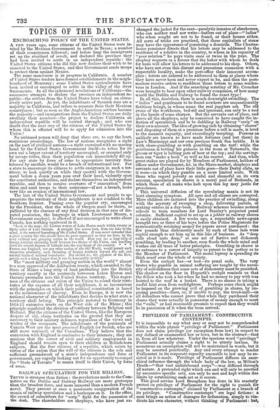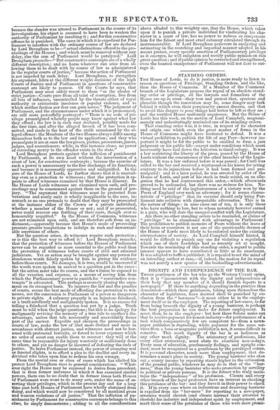PRIVILEGE OF PARLIAMENT: CONSTRUCTIVE CONTEMPTS.
IT is impossible to say what may or may not be comprehended within the wide phrase "privilege of Parliament." Parliament does not claim privilege (or exemption from law) in respect to any defined or enumerated law or laws, but in the abstract—that is from all law whatever. Under the specious word "privilege" Parliament actually claims a right to be utterly lawless. ' So monstrous an assumption will not be maintained m words, but it may be asserted practically. Any and every attempt to render Parliament in its corporate capacity amenable to law may be re- sisted as it is made. Privilege of Parliament diffuses its anar- chical influence through the whole body of the law, as Milton's Death—" that vast unhidebound corps "—was diffused through all nature. A pretended right which can and will only be asserted by successive specific acts, can only be met and kept within due limits by scrutinizing each- act as it occurs.
This good service Lord Brougham has done in his masterly protest on privilege of Parliament for the right to punish for
constructive contempts," claimed by Parliament as a branch of its privilege. "Constructive contempts " are legal fictions : a man brings an action of damages for defamation, simply to vin.- dicate his own character, without thinking of Parliament: but, because the slander was uttered to Parliament in the course of its investigations, his object is assumed to have been to weaken the authority of Parliament by insulting it ; and for this constructive .offence he is punished. The cases in which it is expedient for Par- liament to interfere with the ordinary, course of law are declared by Lord Brougham to be—" actual obstructions offered to the pro- ceedings of the Houses ; and which must be removed without any delay, else the arm of Parliament would be paralyzed." Lord Brougham proceeds—" But constructive contempts are of a wholly different description and no harm whatever can arise from al- lowing them to be dealt with by course of law as administered in the regular courts of justice,', because the action of Parliament is not impeded by such delay-. Lord Brougham, to strengthen his argument, hints at the different weight decisions of the high Courts of Justice and of Parliament in questions of constructive contempt are likely to possess. Of the Courts he says, that Parliament may most safely resort to them "as the abodes of strict justice—Courts pure from all taint of corruption, free from all bias of influence, uncontrolled by the threats either of royal authority or aristocratic insolence or popular violence, and to which neither faction nor fear can gain access." The judgment of Parliament, and the circumstances under which it is pronounced, are still more powerfully portrayed : "There is no code of pri- vilege promulgated whereby people may know against what law they offend ; the law is in each case declared, possibly made for the Ent time, and after the alleged breach of it has been com- mitted, and made in the heat of the strife occasioned by the al- leged offence: the Members of the two Houses always differ among themselves both as to the law and its application ; and they who promulgate it are at once the lawgivers, parties, prosecutors, jurors, judges, and executioners; while, in this instance alone, no power of extending mercy to the offender exists in the state." Lord Brougham protests against the infliction of punishment *by Parliament, at its own hand without the intervention of a court of law, for constructive contempts • because the exercise of such a power is unnecessary to the free discharge of its functions, and because it is necessarily oppressive and undignified. In the case of the House of Lords, he further shows that it is unavail- ing even as a protection to witnesses ; that the protection it ap- pears to afford witnesses examined by that House is illusory,. In the House of Lords witnesses are examined upon oath, and pro- ceedings may be commenced against them on the ground of per- jury. "The argument that witnesses must be protected from vexatious and costly suits is wholly inapplicable to the case, in- asmuch as no one pretends to doubt that they may be prosecuted at the instance either of the Crown or a private individual, whether a member of the House or not ; and if so prosecuted, never could recover-one farthing of their costs, though ever so honourably acquitted." In the House of Commons witnesses are not examined upon oath, and are therefore safe from an in- dictment,—apparently because that House's mode of proceeding presents greater temptations to indulge in rash and unwarrant- able aspersions of others. But the question arises, do witnesses require such protection ; or is this the best way to afford it? Lord Brougham remarks, that the protection of witnesses before the Houses of Parliament never can be regarded as more essential to the public weal than the protection of witnesses before courts of civil and criminal judicature. Yet an action may be brought against any person for slanderous words falsely spoken by him in giving his evidence before those courts. No damages, it is true, would be recovered if the words were spoken in answer to a question put in the cause : but the action must take its course, and the witness be exposed to all the vexation and expense, as a means of saving him from which the Parliamentary power to punish for "constructive con- tempts" is advocated. This perhaps is scarcely placing the argu- ment on its strongest basis. To improve the law and the practice of courts, seems the best mode of affording due protection to wit- nesses, not the concession to Parliament of a power so dangerous to private rights. A calumny properly is an injurious falsehood, or a truth needlessly and malignantly spoken. It is no excuse for telling a falsehood that a question was put by a judge. Truth must be told when the judge questions ; but this is no apology for malignantly reviving the memory of a true tale to another 's dis- advantage, unless that tale necessarily and unavoidably forms part of the answer. Expedite and cheapen the proceedings in courts of law, make the law of libel more distinct and more in accordance with abstract justice, and witnesses need not be har- assed with protracted lawsuits, or forced to incur expenses which no order of court can enable them to recover : they will at the same time be responsible for injury wantonly or maliciously done to others, and yet no danger be incurred of defeating the ends of justice. To leave Parliament instead, the power of avenging real or fancied slights, is to afford a plea to the duellist and every in- dividual who takes upon him to redress his own wrongs. From the special case or class of cases which has elicited his protest Lord Brougham rises to general considerations. "What- ever right the House may be supposed to derive from precedent, that is from former instances in which it has exercised similar powers, there can be no doubt that in former times both Houses of Parliament were wont to do many acts, under the name of as- serting their privileges, which in the present day and for a long time past both Houses of Parliament have wholly abstained from doing, and which would now be considered by all mankind gross And wanton violations of all justice." That the infliction of pu- aishment by Parliament for constructive contempts belongs to this class, he amply demonstrates ; adding to all the considerations above alluded to this weighty: one,. that the House which takes upon it to punish a private individual for vindicating his cha- racter in a court of law, has no power to redress or compensate him for the falsest and most cruel calumny circulated through its instrumentality. If Lord Brougham persevere in analyzing and estimating in the searching and impartial manner adopted in his recent protest, every specific assertion of Parliamentary privilege as it emerges, he will enlighten and rectify public opinion on this great question ; and if public opinion be corrected and strengthened, even the boasted omnipotence of Parliament will not dare to out- rage it.



























 Previous page
Previous page